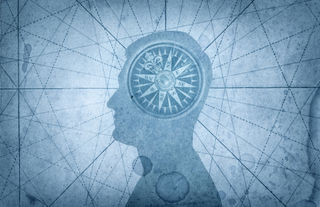Embarrassment
Shame Reframed: Pointing Towards Repair
Part 2: Disrupted connection and the value of shame.
Posted January 1, 2020 Reviewed by Jessica Schrader
Humans are, first and foremost, relational beings. The very instant a child enters this world, his survival depends on connection with at least one other person.

Nature has prepared him for this moment. Shortly after birth, an infant laid on his mother’s chest will move his bleary eyes in search of mother’s face. It’s as if he is born anticipating connection, and seeks it out instinctively. The pursuit of connection is, in fact, an inborn biological, sociological, and evolutionary imperative.
Throughout life, we will seek connection with other people. Throughout life, as well, we will lose connection for a brief moment, for a time, or forever. In moments when we lose the excitement human commune can bring, we are triggered to feel shame. Shame signals that something that felt good here moments ago, just ended abruptly. My positive feelings about the connection have been interrupted. And, my tendency may be to shut down or withdraw into myself, at least momentarily.
Shame experiences
As an adult what judgments can interrupt those good feelings I have in connection with another person? What judgments interrupt even my good feelings about myself?
The experience of shame is an “outside dance,” and an “inside dance.”
On the “outside” we feel ashamed if another person appraises us and deems us “unfit” for connection. We may be told we’re not good enough; or we’re not living up to some standard; or maybe we’re “too much” (too loud, too quiet, too inexperienced, too “different”). These messages can be delivered with words, a look, or a tone of voice.
“Inside” we feel ashamed if our own self-appraisal tells us we’re not “good enough” to belong. What many now call the “inner critic” can flatten us with a laundry list of our shortcomings.
Donald Nathanson, M.D. identified areas of shared experiences in Western culture where others or ourselves may judge us “unfit” for belonging. These areas of appraisal all engender the vulnerability that comes with the very human desire for connection.
They include:
- Matters of size, strength, ability and/or skill: Am I tall enough? Am I educated enough? Am I athletic enough?
- Wishes and fears about closeness: Do I dare take the risk to move closer? To reveal my true feelings? To be vulnerable?
- Competition and comparisons: How do I measure up to other people? How do I measure up to my “ideal” self?
- One’s sense of self-worth and value: Am I lovable? What do I have to offer?
- One’s sense of personal attractiveness: Am I too fat, too thin, too old?
- Sexuality: Is there something wrong with me? Are my preferences normal?
- Loss of any kind: Losing a job, a marriage, a loved one, good health: loss of any kind carries a sense of powerlessness and, therefore, shame.
These are general categories of shame experiences. Some experiences of shame are unique to us based on our own history and experiences of living. What triggers my shame may not trigger yours. If I grew up with a very critical father, my relationship with male authority figures may be fraught with the potential of feeling shamed by even slightly negative remarks. If you grew up with a very supportive father who listened to you when your feelings were hurt or you objected to something he said, your shame might still be triggered by a critical comment, but it won’t become so overwhelming that you can’t speak up on your own behalf for some resolution and repair of the connection.
The Compass of Shame
Whether shame is triggered by an “outside” or “inside” judgment, our eyes turn inward and the feelings of being found “unworthy” can seem scorchingly unbearable.

Noxious as shame can feel, most of us do something quickly to escape the pain of it. Nathanson identified four “scripts” we use in those moments. He called it The Compass of Shame.
The points on the compass are:
- Withdrawal: We are in withdrawal when we want to hide, run away, go silent or wish the earth would just open up and swallow us. Withdrawal can actually serve as a healthy time-out when we’re in the moment of shame.
- Avoidance: Our society gives us all kinds of ways to avoid feeling shame through the use of substances (particularly alcohol and cocaine); process addictions (like eating disorders, gaming, gambling or sex addictions); or acquisitiveness (owning the right car, the right home, the right name brand clothes.)
- Attack Other: “Attack other” is a top go-to script for shame management in our society. Comparison, competition, outright verbal/physical aggression, gossip, bullying, road rage, and fan rage reside on this point of the compass
- Attack Self: “Attack self” includes being overly self-critical; and/or, tolerating bad or abusive behavior from others in the interest of maintaining “connection.”
While we can move into any/all of these behaviors when shame is triggered, generally we have a preference for one or two of these scripted responses to feeling shame.
Most times we don’t even know our shame has been triggered until we find our plane already landed in one of these behaviors. It’s the nature of how lightening-quick our emotions and scripted responses move.
With a little distance from the triggering moment, the task then is to back up; to revisit what just happened here or yesterday or last week when this feeling took up residence in our psyche. The next step is to decide what the feeling is directing us towards. Is it a rapprochement, an attempt at repair, accepting individual responsibility, or a modification in the relational connection all-together?
We will explore this process further in the next post.
Disclaimer: This post is for informational purposes only. It is not a substitute for professional or psychological advice, diagnosis or treatment. Contact a qualified healthcare provider before implementing or modifying any personal growth or wellness program or technique, and with questions about your well-being.
Copyright 2020 Jennifer Lock Oman, LISW. All rights reserved.




